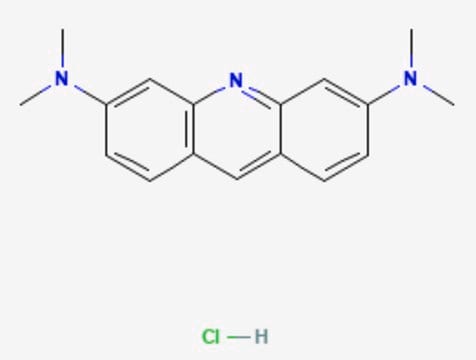158550
Acridine Orange hemi(zinc chloride) salt
Dye content 85 %
Sinónimos:
3,6-Bis(dimethylamino)acridine hydrochloride zinc chloride double salt, 3,6-Bis(dimethylamino)acridinium chloride hemi(zinc chloride salt), Basic Orange 14
About This Item
Productos recomendados
form
powder
Quality Level
composition
Dye content, 85%
solubility
H2O: 1 mg/mL, clear, orange to very deep orange
λmax
489 nm
application(s)
diagnostic assay manufacturing
hematology
histology
storage temp.
room temp
SMILES string
Cl[H].Cl[H].Cl[Zn]Cl.CN(C)c1ccc2cc3ccc(cc3nc2c1)N(C)C.CN(C)c4ccc5cc6ccc(cc6nc5c4)N(C)C
InChI
1S/2C17H19N3.4ClH.Zn/c2*1-19(2)14-7-5-12-9-13-6-8-15(20(3)4)11-17(13)18-16(12)10-14;;;;;/h2*5-11H,1-4H3;4*1H;/q;;;;;;+2/p-2
InChI key
RAHGLSRJKRXOSY-UHFFFAOYSA-L
¿Está buscando productos similares? Visita Guía de comparación de productos
Application
Biochem/physiol Actions
signalword
Warning
hcodes
Hazard Classifications
Muta. 2
Storage Class
11 - Combustible Solids
wgk_germany
WGK 3
flash_point_f
Not applicable
flash_point_c
Not applicable
ppe
Eyeshields, Gloves, type N95 (US)
Elija entre una de las versiones más recientes:
¿Ya tiene este producto?
Encuentre la documentación para los productos que ha comprado recientemente en la Biblioteca de documentos.
Los clientes también vieron
Contenido relacionado
Nancy-520 for DNA Detection and Quantitation
Nuestro equipo de científicos tiene experiencia en todas las áreas de investigación: Ciencias de la vida, Ciencia de los materiales, Síntesis química, Cromatografía, Analítica y muchas otras.
Póngase en contacto con el Servicio técnico












